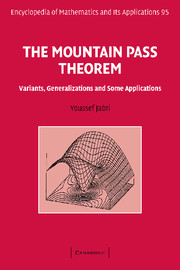Book contents
- Frontmatter
- Contents
- Introduction
- 1 Retrospective
- I First Steps Toward the Mountains
- II Reaching the Mountain Pass Through Easy Climbs
- 5 The Finite Dimensional MPT
- 6 The Topological MPT
- 7 The Classical MPT
- 8 The Multidimensional MPT
- III A Deeper Insight in Mountains Topology
- IV The Landscape Becoming Less Smooth
- V Speculating about the Mountain Pass Geometry
- VI Technical Climbs
- A Background Material
- Bibliography
- Index
8 - The Multidimensional MPT
Published online by Cambridge University Press: 04 September 2009
- Frontmatter
- Contents
- Introduction
- 1 Retrospective
- I First Steps Toward the Mountains
- II Reaching the Mountain Pass Through Easy Climbs
- 5 The Finite Dimensional MPT
- 6 The Topological MPT
- 7 The Classical MPT
- 8 The Multidimensional MPT
- III A Deeper Insight in Mountains Topology
- IV The Landscape Becoming Less Smooth
- V Speculating about the Mountain Pass Geometry
- VI Technical Climbs
- A Background Material
- Bibliography
- Index
Summary
Fortunately, there are existence results for saddle taylor-made for applications. These are the famous (infinite-dimensional) mountain pass lemma and its variants, due to Ambrosetti and Rabinowitz.
M. Struwe, Variational methods, applications to nonlinear partial differential equations and Hamiltonian systems, Springer-Verlag, 1990In this chapter, we present some of the earliest variants of the MPT. We will focus our attention on a generalization by Rabinowitz [737], with a more general geometric condition that involves a splitting of the underlying space into two topologically supplementary spaces, one of them being finite dimensional. This extension of the MPT to higher dimensions was essentially destined to provide a more adapted tool than the MPT to treat particular kinds of semilinear elliptic equations.
The multidimensional MPT of Rabinowitz [737], which is the main result in this chapter, dates from 1978 and constitutes in some sense the beginning of the fame for the MPT. It allows us to treat semilinear elliptic partial differential equations where the nonlinearity contains a linear part at 0, as we will see later in Section 8.2, in contrast with the superlinear problem seen in Chapter 7 where the nonlinearity had the form f (s) = o(|s|) in a neighborhood of 0.
- Type
- Chapter
- Information
- The Mountain Pass TheoremVariants, Generalizations and Some Applications, pp. 81 - 90Publisher: Cambridge University PressPrint publication year: 2003

